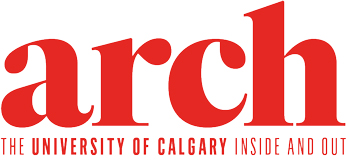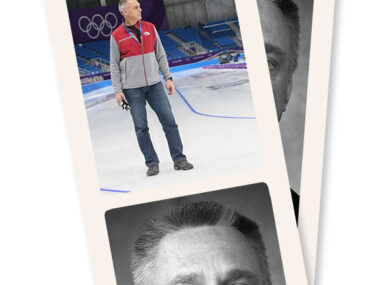Written by Jacquie Moore, BA’97
“That’s a good question — but instead of answering it, let me do what lawyers do, and answer a different question.” With characteristic wit, Dr. Ian Holloway deftly reframes a question about what he values most in legal education, instead offering a motto that underpins his unique, enormously influential perspective.
“My philosophy is ‘tradition in form, change in substance,’” says Holloway, PhD, who will step down as dean of the University of Calgary’s Faculty of Law this June. In other words, he adds, “I think it’s very important that we maintain old traditions — they are our link with the past and with the generations who came before us — but as the world changes, we need to change what we do, and how we do it.”

Certainly, Holloway has demonstrated that examining the past — and understanding the wider world — is essential to breaking new ground for a more socially just future.
Holloway’s impact on legal education in Canada can’t be overstated. With 24 years leading law faculties first at the University of Western Ontario (now Western University) and then at UCalgary, Holloway is the longest-serving dean of a law school in North America, and the longest in Canada in the last sixty years. That adds up to approximately one in every 100 Canadian lawyers, practicing since 2000, having had Holloway as dean while completing their degree.
Fortunately for Canadians and the future of our legal system, Holloway’s impact on his former students and, more broadly, on curricular and institutional changes to legal education, have been profoundly and positively innovative.

Though he couldn’t have fathomed it at the time, the seeds for Holloway’s future as a legal-education leader and changemaker were planted when he was himself a law student at Dalhousie University. In traditional fashion, his legal education followed the dichotomy of theory and skill — three years of classroom learning and one year spent articling. Holloway says, once he graduated, he quickly discovered the gulf between what he did as a student and what he was expected to do as a lawyer was, as he puts it, wider than it needed to be.
“I believe that theory and skill need to go hand in glove,” he says. “I always say that a lawyer with theory and no skill is useless, and a lawyer with skill and no theory is a malpractice case waiting to happen.”
Holloway says he believes that, if you want someone to really understand something from a theoretical basis, you must teach them how to do it — and, he adds, “that includes ensuring they have an appreciation of the past and how things came to be.” His years spent serving in legal and academic roles in Australia, Singapore, England and the U.S. further refined his ideal of what a legal education can and should be.
“I came to realize that Canada is a more insular country than we generally think it is,” Holloway says. “But, if we’re going to flourish in an increasingly globalized world, we need to be far more outward-looking than we have been. Even lawyers working here in our own city need an education that increases their global mindset in order to serve our communities.”

Affable as he is, Holloway got comfortable with controversy early in his career. As dean of Western’s law school, he advocated for students by going out of his way to forge much closer ties with the law firms that employed the highest number of new graduates — a move that didn’t sit well with some of his more traditional ivory tower-inclined colleagues.
Holloway’s brand of practical advocacy — for students, for special needs communities, and for greater equity in the faculty and in the profession — has been his guiding star as he has initiated profound change in legal education at UCalgary during his tenure as dean, which began in 2011.
Over the past decade, UCalgary Law’s Calgary Curriculum — a set of courses and student experiences implemented under Holloway — has put this institution at the global vanguard of contemporary legal education. UCalgary’s novel curriculum aims to train students to adapt to a dynamic and evolving legal industry. It includes courses on experiential learning (something which UCalgary embraced before most other schools) and other unique-to-Calgary courses on things like leadership, business skills, marketing and client development, entrepreneurship, legal innovation and a certification in common law in French so that lawyers can practise in both official languages.
As well, Holloway supported the opening of the Public Interest Law Clinic, in which students gain theoretical and practical exposure to litigation on matters of public interest such as environmental stewardship and habitat protection or government transparency and democratic accountability. In 2018 and again in 2023, the Public Interest Law Clinic, supported by a team of UCalgary law students, appeared in front of the Supreme Court of Canada on behalf of a client — a rare opportunity for a practising lawyer, and almost unheard of for students!

He also initiated a partnership with the University of Houston where students can obtain both Canadian and American law degrees focused on energy law. And a newly established partnership with India’s Jindal Global University has created the first India-Canada dual law degree program that empowers students from India to obtain joint Indian and Canadian law degrees.
“It’s an amazing opportunity for students from India and for students here in Calgary to expand their horizons,” says Holloway. “It’s going to help both groups have a broader perspective on the world.”
To Holloway, all these initiatives have not only elevated the student experience, but their success represents the innovative and resourceful spirit of the faculty.
“I’m proud of lots of things we’ve done,” says Holloway. “But what I’m most proud of is how we’ve created a cultural headspace where we say, ‘We know it may not work, but let’s try it!’”
Holloway’s entrepreneurial drive has encouraged other initiatives aimed at elevating student and professional experiences, including the novel BLG Business Venture Clinic. The program provides students with the opportunity to work with startup companies, offering legal services and contracts during clinic hours in UCalgary’s Hunter Hub for Entrepreneurial Thinking under the supervision of practising lawyers from BLG Law. More than 400 clients have received services.
Thanks in large part to Holloway’s efforts to broaden faculty recruiting, UCalgary is now one of the most diverse law faculties in the country. Significantly, the school now has proportionately far more Black law students than the University of Toronto, which has a third larger student body. That’s not what someone would expect to find in Calgary, Alberta.

UCalgary was the second law school in Canada to implement a Black Student Equitable Admissions Process, initiated by the UCalgary chapter of the Black Law Students’ Association (UCBLSA). It encourages applicants to write about their experience and background influencing their decision to become a lawyer (in April 2024, UCBLSA won the prestigious Large Chapter of the Year award at the 33rd National Black Law Students Conference in Toronto).
“Ian was so supportive and proactive,” says Keshia Holloman-Dawson, BA’20, MPP’22, JD’22, a former student who had contributed to launching the UCBLSA. “When he heard about the process, he reached out to me. He got involved immediately and helped us ensure we’d be successful.”
UCalgary Senator Wilma Shim, BSc’07, JD’10, teaches sports law in the faculty and is also a member of the Alberta Human Rights Commission. She echoes Holloman-Dawson’s experience of the dean as impactful and enormously positive.
“I wanted to start a law alumni network to create a community so that we could all stay engaged and connected,” says Shim. “I contacted Ian right away and he was immediately supportive. He has a special ability to listen to and understand people and to create space for others to push themselves, push boundaries with support, and to grow.”
Looking ahead, as Holloway transitions away from his leadership role, he plans to dive deeper into current research projects and — happily for students and faculty at UCalgary — he’ll continue to teach (he’s a rarified law-school dean who has taught throughout his tenure).
“I say all the time that our mission is to prepare students for the profession they are joining, not the one I joined,” says Holloway. “In other words, we’ve been ahead of tomorrow for a long time now. And that’s something all of us at UCalgary should be proud of.”




